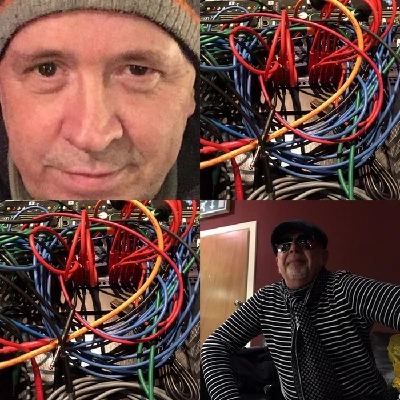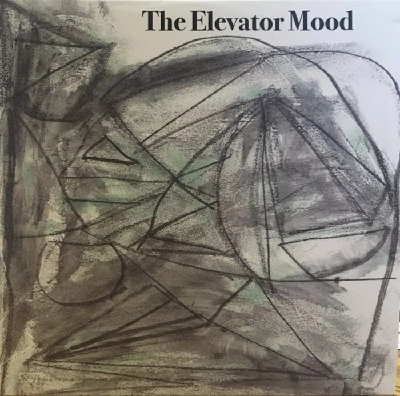published: 23 /
2 /
2020

John Clarkson speaks to Primevals frontman Michael Rooney and former Jolt bassist James Doak about their new project The Elevator Mood and its critically acclaimed eponymous debut album.
Article
The Elevator Mood had a sleeper hit in Scottish independent music circles with their self-released, eponymous debut album when it came out in October of last year. It won critical acclaim, including a glowing review in 'The Scotsman', while music writer Gus Ironside, whose opinion is always worthy of note, made it his Album of the Year in both 'Louder Than War' and 'Vive Le Rock!'.
The group is the project of two Glaswegian musicians, Michael Rooney (vocals, acoustic guitar, harmonica, alto saxophone, alto saxophone, gong) and James Doak (electric guitar, acoustic guitar, bass guitar, mandolin, digital synths), who began meeting up once a week with no expectations other than to see what came out of their sessions together. Rooney is also the front man with garage rock group The Primevals, who have since forming in 1983 recorded ten studio albums, while Doak was the bassist in The Jolt, who were in the first wave of 70's Scottish punk bands.
'The Elevator Mood' was recorded at home over a year by Rooney and Doak, who ten took their recordings into Anchor Lane Studio in Glasgow to add drums and overdubs from other musicians including violin, piano, organ, piano and flute.
The album's thirteen tracks include the jarring, lo-fi blues of 'All Come'; the deadpan 'Velvet Underground'-esque 'Fatalistic' Attitude': the jangling, organ-soaked 'Hard to Read', and the breezy yet underlyingly caustic 'Flower'.
Pennyblackmusic spoke to Michael Rooney and James Doak about The Elevator Mood.
PB: You started to write together in early 2017 with no set agenda, other than to meet on Monday nights to share ideas with an open mind. At what point did you realise that you had an album in you?
JAMES DOAK: Towards the end of 2017 we both came to the conclusion there was something happening with the tracks and that we should try to find a way to finish them in such a way that we could put something out there. It took most of 2018 to figure out what that way could be. We got down to work in Anchor Lane Studio in Glasgow in December 2018, and finished that part of the job in January 2019. The rest of the time was taken up by mastering, manufacturing, package design, artwork etc.
MICHAEL ROONEY: The songs just came together and it did not matter too much to us if there were any imperfections. It was just a loose collaboration. I also realised Jim had not recorded a lot over the years, so I thought it would be interesting to try and work together.
PB: The Jolt had reformed for some shows in 2016, the Primevals are always active and you both work full-time. How easy was it sticking to that routine of meeting on Monday nights considering how much else you both had on?
MR: It just became a regular thing as we were both curious to see how the music evolved as we had no big agenda.
JD: Those Jolt shows never happened in the end, so sadly we never got to reform. Michael and I are good mates, so it wasn’t a hardship getting down to work with him. Quite the opposite,a real pleasure, something to look forward to each week. There was the odd cancellation due to other commitments with family, work etc but not many.
PB: The Jolt were one of the first punk bands in Scotland and the Primevals first formed in the early 1980s. How well did you know each other before you formed the Elevator Mood and how long have you been friends?
JD: Like a lot of folk of a certain age, who live in Glasgow and love music, I’ve known Michael for ever it seems. I certainly remember buying records from him in various shops and stalls around the city in the 1970s. Our paths crossed in the two bands from time to time, but our friendship really cemented in London in the early 1990s. I’d been living there since ’77, Michael moved down for a couple of years and we hung out a lot and bonded over his VHS collection of old Magic Band footage.
MR: I knew Jim a bit from the Jolt days. In London in the early '90s we spent more time together. Drinking mainly.
PB: One can hear elements of the Velvet Underground, the Doors, the Waterboys, Lloyd Cole and jazz in your sound, but the Elevator Mood also inhabits its own space and doesn’t sound especially like the Primevals or The Jolt. Was it important to you to do something different from your other groups and was that a criteria from the outset?
JD: Wow, thank you! Some of those are big heroes! There wasn’t a considered manifesto of any kind. More a feeling of excitement in the understanding that we wouldn’t rule out ideas until we’d given them a proper go and found out if they led anywhere of interest to us or not. We came up with well over thirty decent pieces, songs, instrumentals, fragments. It was a process of refinement to get it down to thirteen for the album.
MR: We both share a big interest in lots of different music, and this was an opportunity to try somethings in a different way. It was a blank canvas if you like, with no preconceived ideas before we went in to the small bedroom studio set-up to record. Perhaps a few chords, a melody line, a title or a lyric but that was pretty much it. For me there was a sense of sonic experimentation. The home environment made it conducive for a quieter, softer approach which felt right.
PB: The basic tracks are home recordings with drums and other overdubs added in a studio, Anchor Lane in Glasgow. The album involves another five musicians. Did they record their parts at home with you or were their bits all done in the studio? How long were you in Anchor Lane for?
JD: Initially it was really just myself and Michael in a room with a laptop and a few mics, with John Honeyman (keyboards/bass) dropping by occasionally. John and Rhod Burnett (drums) played a big part later on in proceedings, pulling things together in Anchor Lane. My wife Fiona Gibson (tenor sax/ flute) and Rafe Fitzpatrick (violin) were the last pieces in the puzzle pieced together at Anchor with Luigi Pasquini(engineer/analog synth) at the helm. All in all I think we clocked up around seven days of studio time. Luigi did a great job, and was constantly generous and enthusiastic about our “crazy DIY album”
MR: We had a few sessions in Anchor Lane Studios. Luigi did a good job and was patient with us. The record has a lot of different types of feel. I don’t think many people approach recording in such a diverse way, incorporating different genres and soundscapes in the one sitting.
PB: 'The Elevator Mood’ has had fantastic reviews. Have you been surprised at how well it has been received?
JD: Yes, to be honest. We believed we had made an interesting record, but we had no reason to expect an audience. We knew that it certainly wasn’t what people might have expected us to come up with given our history. The response has all been a really pleasant surprise.
MR: It has been really great to see so many people showing an interest and supporting us.
PB: It is dedicated to the memory of your friend and Jolt drummer, Iain Shedden, who died suddenly in September 2017. How much of an impact did his death have on the recording? Did he have the opportunity to hear some of the material on ‘The Elevator Mood’ before he died?
JD: Iain’s death had a big impact on both myself and Michael. We were close friends since our school days and I miss him a lot. Thinking about the kind of person Iain was and what he meant to me made me determined to get on and do things rather than just talk about them or procrastinate. He stayed with my wife and I when he came over from Australia in August 2017 to tour in the re-formed Summerhill. He did indeed hear a few of the rough home studio things we’d done at that point and he was very encouraging, as he always was about everything.
MR: Iain was a great human being. We miss him dearly.
PB: ’Flower’ is “for Matthew Bloomer”. Who is he and why did you dedicate it to him?
JD: Matthew Bloomer was a vulnerable young man who died far too soon on the freezing streets of Glasgow in March 2017.
MR: I was out that morning when he was found. I noticed that there had been some activity around the exact location where he died. He had been begging and he had probably been out all night. It was extremely cold. I passed the same spot later that night and there was nothing there, not even a flower. It hit me hard. I know a lot of people who are employed in addiction services work and who work really close to that location. It’s not about blaming individuals. It just made me think about the system. The way we look after each other is pretty sick. I know nothing about Michael on a personal level, but no one deserved that.
PB: The artwork is stunning. Who designed that?
JD: I did, and thank you. That really means a lot to me. I started drawing and painting a little over 18 months ago at the encouragement of my wife. I’m a novice, but it is a real passion.
MR: Jim’s art work is really great and constantly impresses.
PB: Do you have any plans to play any dates as the Elevator Mood? Will there be a second album?
JD: We played a live radio session on local radio at CamGlen Radio on 107.9FM on the 27th January). That was our live debut. Michael, John, Rhod, Rafe and myself with some new faces, Thomas Marsden (guitar) and Kornelius Pukinskis (alto saxophone). Michael and I are definitely up for gigs, and are weighing up our options in that space. We started work on the second album last weekend - the usual rock’n’roll treadmill cliche, I’m afraid. I cooked some fish, Michael brought a cake and we banged away on guitars and my old piano for a couple of hours. Fishcake Productions are back in business.
MR: The concept is expanding and it is great to pull in other people. We want to work with individuals who are keen to express themselves. Hopefully, we can give them that scope. Who knows? Perhaps it will evolve into a Sun Ra Arkestra or Parliament/Funkadelic type of thing with a stage full of participants. Or it may not, that might just be in my head! Either way, it will be fun. The really important thing is that we don’t get hung up on technicalities. We want to communicate and connect in a very human way.
PB: Thank you.
Band Links:-
https://www.facebook.com/The-Elevator-
Play in YouTube:-
Picture Gallery:-
